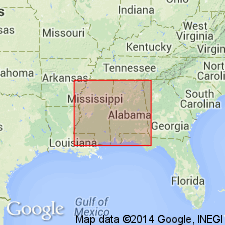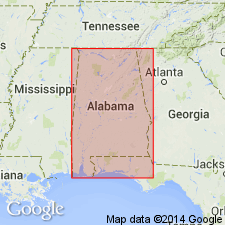
- Usage in publication:
-
- Pine Barren member*
- Modifications:
-
- Named
- Dominant lithology:
-
- Limestone
- Shale
- Sand
- AAPG geologic province:
-
- Mid-Gulf Coast basin
Summary:
Name Pine Barren proposed for lower member of Clayton formation in Wilcox Co, southwestern AL. Hard crystalline fossiliferous coarse sandy limestone ["TURRITELLA rock"], about 8 ft thick, forms upper part of member. Below this is a sequence of limestone, sandy clay shale, and loose to moderately porous to tight fine-grained calcareous sand. Beds of crystalline "TURRITELLA-bearing limestone occur at several levels in these loser beds. Coarse-grained sandy channel limestone or calcareous sand occurs sporadically at base. Maximum thickness about 175 ft. Underlies McBryde limestone member (new). Age is Paleocene.
Source: GNU records (USGS DDS-6; Reston GNULEX).

- Usage in publication:
-
- Pine Barren Member
- Modifications:
-
- Overview
- AAPG geologic province:
-
- Mid-Gulf Coast basin
Summary:
In Wilcox, Lowndes, and Butler Cos, the Clayton Formation of the Midway Group is subdivided into two members. The lower Pine Barren Member consists of 150 ft of medium-gray fossiliferous calcareous silt, glauconitic sand, and thin beds of gray sandy limestone, while the upper McBryde Limestone Member consists of gray to white marl and clayey chalk 20 to 50 ft thick. Age is Paleocene (Danian).
Source: GNU records (USGS DDS-6; Reston GNULEX).
For more information, please contact Nancy Stamm, Geologic Names Committee Secretary.
Asterisk (*) indicates published by U.S. Geological Survey authors.
"No current usage" (†) implies that a name has been abandoned or has fallen into disuse. Former usage and, if known, replacement name given in parentheses ( ).
Slash (/) indicates name conflicts with nomenclatural guidelines (CSN, 1933; ACSN, 1961, 1970; NACSN, 1983, 2005, 2021). May be explained within brackets ([ ]).

